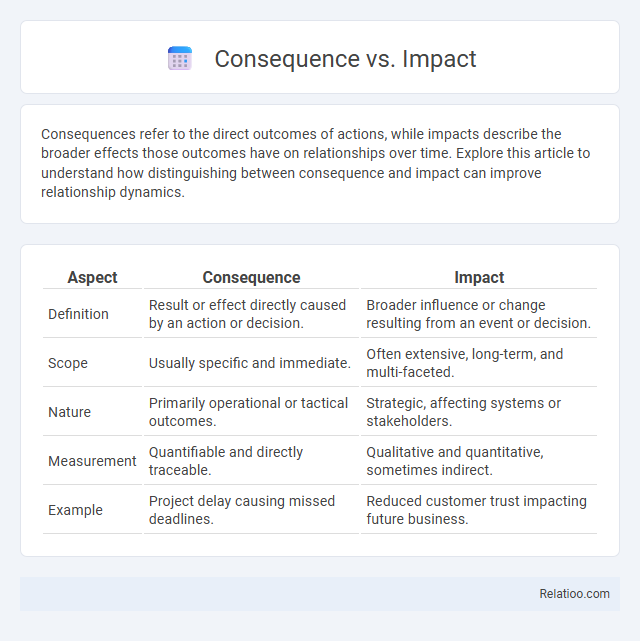Consequences refer to the direct outcomes of actions, while impacts describe the broader effects those outcomes have on relationships over time. Explore this article to understand how distinguishing between consequence and impact can improve relationship dynamics.
Table of Comparison
| Aspect | Consequence | Impact |
|---|---|---|
| Definition | Result or effect directly caused by an action or decision. | Broader influence or change resulting from an event or decision. |
| Scope | Usually specific and immediate. | Often extensive, long-term, and multi-faceted. |
| Nature | Primarily operational or tactical outcomes. | Strategic, affecting systems or stakeholders. |
| Measurement | Quantifiable and directly traceable. | Qualitative and quantitative, sometimes indirect. |
| Example | Project delay causing missed deadlines. | Reduced customer trust impacting future business. |
Understanding Consequence and Impact
Understanding consequence and impact involves recognizing that consequences are the direct, immediate results of an action or event, often measurable and specific. Impact refers to the broader, long-term effects that influence systems, behaviors, or environments, often encompassing social, economic, or psychological dimensions. Distinguishing between consequence and impact is critical for effective decision-making, risk assessment, and strategic planning in various fields such as business, environmental science, and public policy.
Defining Consequence: What Does It Mean?
Consequence refers to the outcome or result of an action, event, or decision, often carrying a neutral or negative implication depending on context. It signifies the direct effect that follows an initial cause and can range from minor to significant in scope. Understanding consequences is essential for assessing risks and making informed decisions.
Defining Impact: Scope and Significance
Impact defines the scope and significance of an event by measuring its broader effects on systems, communities, or environments. You must consider both immediate and long-term changes when assessing impact to understand its full extent. Distinct from consequence, impact encompasses a wider range of outcomes and the lasting influence on affected stakeholders.
Key Differences Between Consequence and Impact
Consequence refers to the result or outcome directly caused by an action or event, often neutral or negative, whereas impact denotes the broader effect or influence that action or event has on a system, community, or environment. Key differences include consequence being specific and measurable, often immediate, while impact can be longer-term and more diffuse, involving qualitative and quantitative changes. Understanding these distinctions helps in risk assessment, project evaluation, and strategic planning by clarifying whether an outcome is a direct result or a broader influence.
When to Use Consequence vs Impact
Use "consequence" to emphasize a result that follows logically or inevitably from an action or event, often carrying a negative or neutral tone. "Impact" highlights the effect or influence something has, typically implying a more immediate, tangible, or significant change. Choose "consequence" when discussing outcomes related to cause and effect, and prefer "impact" when describing the extent or intensity of an effect on a situation or object.
Real-World Examples: Consequence vs Impact
Consequences refer to the outcomes or results directly caused by an action, such as the economic downturn following a major factory closure. Impacts describe the broader effects these consequences have on various systems, like increased unemployment rates and community hardship resulting from the same closure. Real-world examples illustrate that while consequences are immediate and specific, impacts encompass longer-term and widespread changes across social, economic, and environmental factors.
Measuring Consequence and Impact
Measuring consequence involves quantifying the direct outcomes or results of an event, focusing on tangible effects such as financial loss, injury, or system downtime. Impact measurement goes beyond immediate consequences, assessing broader and longer-term effects on stakeholders, environment, or organizational reputation. Your ability to differentiate and accurately measure both consequence and impact ensures effective risk management and decision-making.
Importance in Decision-Making
Understanding the difference between consequence, impact, and consequence is crucial in decision-making to evaluate potential outcomes accurately. Consequence refers to the result or effect of an action, while impact describes the broader influence or change caused by that result on people, systems, or environments. Recognizing these distinctions helps you prioritize risks and benefits effectively, leading to more informed and strategic decisions.
Consequence and Impact in Business and Policy
Consequence in business and policy refers to the direct outcomes or results stemming from decisions and actions, often quantifiable and immediate. Impact denotes broader, long-term effects that influence organizational strategy, stakeholder well-being, or societal conditions beyond initial results. Understanding the distinction between consequence and impact aids in evaluating risk, measuring success, and designing sustainable policies that address both short-term outcomes and enduring change.
Choosing the Right Term in Communication
Choosing the right term between consequence, impact, and effect depends on the context and precision needed in communication. Consequence often implies a direct result, typically negative or significant, while impact conveys a broader influence or change, sometimes more physical or emotional. Effect refers to the outcome or change caused by an action or event, making it essential to differentiate these terms for clear and accurate messaging.

Infographic: Consequence vs Impact
 relatioo.com
relatioo.com